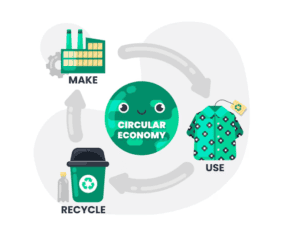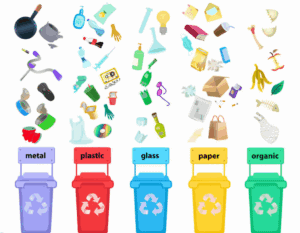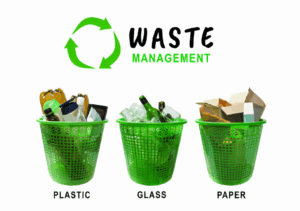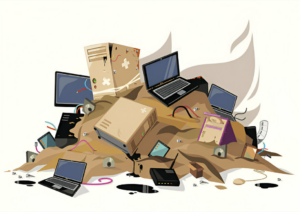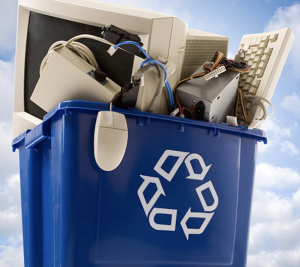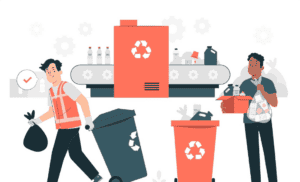As one of India’s major technology hubs, Bangalore is at the forefront of the country’s rapid technological development. Home to a vast array of IT companies, startups, and tech professionals, the city has experienced a surge in the consumption of digital devices. However, this digital boom has also brought with it a mounting challenge: the management of electronic waste, or e-waste. Bangalore, like many urban centers across the globe, is grappling with the environmental and health implications of the growing e-waste crisis. This article delves into the e-waste problem in Bangalore, the current recycling practices, and how individuals and businesses can adopt responsible recycling methods to mitigate the damage.
The E-Waste Problem in Bangalore
Bangalore’s rapid urbanization, coupled with its status as a major IT hub, has significantly increased the demand for electronic devices such as computers, smartphones, and other gadgets. As a result, the city generates substantial amounts of e-waste. According to a report by the Associated Chambers of Commerce and Industry of India (ASSOCHAM), India is the third-largest producer of e-waste globally, with Bangalore being one of the leading contributors.
The life cycle of electronic devices has shortened due to frequent upgrades and rapid technological advancements. Many consumers and businesses regularly replace their electronic devices with newer models, leading to a growing number of discarded gadgets. In 2019, India produced 3.2 million metric tons of e-waste, and a significant portion of this comes from urban centers like Bangalore.
E-waste is not just about old computers or mobile phones. It includes everything from household appliances like refrigerators and washing machines to smaller gadgets such as chargers, batteries, and circuit boards through ewaste in Bangalore. As Bangalore’s tech-savvy population continues to upgrade their electronics, the need for effective e-waste management has become more pressing.
Environmental and Health Impacts of E-Waste
The improper handling and disposal of e-waste pose severe environmental and health risks. E-waste contains various toxic substances, including lead, mercury, cadmium, and brominated flame retardants, which can have long-lasting detrimental effects on ecosystems and human health.
- Environmental Damage: When e-waste is not properly managed, it is often dumped in landfills or incinerated, releasing harmful chemicals into the air, soil, and water. In landfills, the toxic materials from discarded electronics can leach into the soil, contaminating groundwater and agricultural land. This pollution can disrupt the local ecosystem, affecting plants, animals, and, ultimately, human food sources.
- Health Risks: Informal e-waste recycling is common in Bangalore, where waste is often handled by unregulated workers in unsafe conditions. The burning or dismantling of e-waste in open-air environments releases hazardous chemicals and heavy metals, which can cause respiratory problems, skin conditions, and neurological damage. Workers in these informal sectors, often without proper protective gear, are exposed to the harmful effects of e-waste, leading to long-term health consequences.
Current E-Waste Recycling Efforts in Bangalore
Despite the growing concern, there have been initiatives in Bangalore aimed at addressing the e-waste crisis. Both government and private organizations have taken steps to mitigate the impact of e-waste through proper collection and recycling efforts.
- Regulations and Policies: In 2016, India introduced the E-Waste Management Rules, which require producers of electronic goods to take responsibility for the collection and disposal of their products through Extended Producer Responsibility (EPR). This regulation mandates that manufacturers and companies involved in the production of electronics have proper mechanisms in place to collect and recycle their products at the end of their life cycle.
- E-Waste Collection Centers: Bangalore has witnessed the establishment of multiple e-waste collection centers operated by the government, private companies, and NGOs. These centers encourage residents and businesses to drop off their old electronics for proper recycling, ensuring that toxic materials are handled safely, and valuable components are recovered.
- Public Awareness Campaigns: Several campaigns have been launched to raise awareness about the importance of responsible e-waste disposal. Organizations like the Environmental Synergies in Development (ENSYDE) work to educate communities about the risks associated with e-waste and promote sustainable disposal practices.
- Recycling Initiatives: Companies such as E-Parisaraa, India’s first government-approved e-waste recycling facility, play a crucial role in Bangalore’s e-waste management landscape. These facilities use advanced technology to recover metals and other valuable materials from electronic waste, reducing the environmental impact of improper disposal.
Challenges to Effective E-Waste Management
Despite these efforts, Bangalore continues to face significant challenges in managing its e-waste. Several barriers hinder the effective recycling of electronic waste in the city.
- Lack of Awareness: One of the main challenges is the lack of awareness among the general public about the importance of recycling e-waste. Many residents are unaware of the dangers posed by e-waste, and old devices are often stored in households or discarded along with regular waste. This leads to the improper disposal of electronic devices, increasing the risk of environmental contamination.
- Informal Sector: The informal recycling sector in Bangalore continues to dominate the e-waste landscape. Informal recyclers use hazardous methods such as burning, dismantling, or acid treatment to extract valuable materials from electronic waste. These practices are not only harmful to workers but also contribute to environmental degradation.
- Enforcement of Regulations: Although the E-Waste Management Rules have been implemented, enforcement remains a challenge. Many manufacturers and producers do not fully comply with the Extended Producer Responsibility (EPR) guidelines, and proper collection systems are not uniformly available. This lack of stringent oversight allows much of the e-waste generated in the city to go uncollected or improperly disposed of.
How to Recycle E-Waste Responsibly in Bangalore
While the challenges are significant, individuals and businesses can take steps to recycle e-waste responsibly in Bangalore. By following best practices and utilizing available resources, everyone can play a role in reducing the city’s e-waste footprint.
- Identify Authorized E-Waste Collectors: Residents should ensure that their e-waste is handed over to authorized collection centers or recyclers. The Karnataka State Pollution Control Board (KSPCB) has listed licensed e-waste recyclers and collection points where individuals can drop off their old electronics.
- Avoid Informal Recycling: It’s essential to avoid giving e-waste to informal recyclers who lack the proper facilities to safely manage electronic waste. Informal recycling can lead to the release of toxic substances and pose a health hazard to workers and nearby communities.
- Participate in Manufacturer Take-Back Programs: Many electronics manufacturers offer take-back programs where consumers can return old devices for recycling. Brands such as Samsung, HP, and Dell provide collection services that comply with environmental regulations.
- Donate or Repair: Before discarding electronic devices, consider donating them if they are still functional. Many NGOs accept donations of old computers, phones, and other gadgets for refurbishing or redistribution to underserved communities. Additionally, repairing electronics instead of replacing them can extend their lifespan and reduce the amount of e-waste generated.
- Organize E-Waste Collection Drives: Communities, schools, and businesses can organize e-waste collection drives to ensure that large quantities of electronic waste are gathered and sent to authorized recyclers. These drives can raise awareness and provide a convenient way for residents to dispose of their e-waste responsibly.
Conclusion
The ewaste recycling Bangalore is growing, but it can be managed through collective effort, responsible recycling, and government regulation. While progress has been made in creating awareness and establishing recycling programs, the city still has a long way to go in ensuring that e-waste is handled sustainably. By promoting responsible recycling practices, enforcing regulations, and encouraging public participation, Bangalore can take significant strides toward a cleaner, healthier, and more sustainable future.


